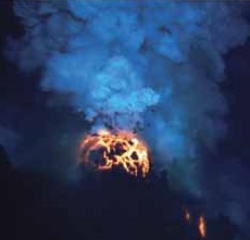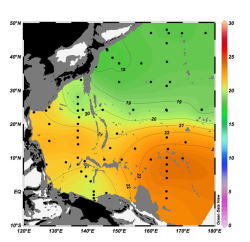RESEARCH
Our interests
We study the physical circulation and environmental change in a wide range of time scale, using various isotopic geochemical techniques.
1.Atmospheric evolution

Our earth has the atmosphere. When and how the atmosphere has got the current compositions?
To answer the question, we analyze He isotopes in mid ocean ridge basalts (MORB).
Helium is an inert gas, and does not return to inner earth after degassing
from the mantle. Helium has two isotopes, primordial 3He and radiogenic
4He. Thus, analyzing elemental ratio respective to 3He, we can estimate
degassing models from the mantle.
Photo by Resing et al. (2011)
2.Deep seawater circulation
 He isotopic tracer can be used not only for understanding atmospheric evolution
but also for studying deep seawater circulation. This is because He is characterized
by, again, an inert gas, an extremely different isotopic compositions between inner
earth and the atmosphere, and undiffusive property in aqueous phase.
He isotopic tracer can be used not only for understanding atmospheric evolution
but also for studying deep seawater circulation. This is because He is characterized
by, again, an inert gas, an extremely different isotopic compositions between inner
earth and the atmosphere, and undiffusive property in aqueous phase.
Our group member joins research crouise, such as Hakuho-maru and Tansei-maru,
for monitoring seawater chemistry and sampling sea sediments.
3.Lost water on Mars

When the Mars has lost liquid water? Our research group studies
Hydrogen isotopes in apatite in Mars meteorite. Hidrogen is a
constituent element of water, and its isotopic ratio is a potential
archive for understanding water amount on Mars in the past.
To understand the mineral formation ages, we also study
Uranium-Lead dating within a single grain size of minerals.
Photo by Jet Propulsion Laboratory (JPL), NASA
4.Biomineralization & Paleoclimatology

Calcareous hard structures produced by corals, foraminifera and bivalves
are highly potential archive recording paleo ocean environment. This is
because the carbonate ions and metals constituting fossil calcium carbonate
are originated from paleo seawater.
High resolution elemental analyses using Nano-SIMS can provide daily-scale
environmental change recorded in giant clam shells.
バナースペース
Department of Chemical Oceaography
Marine Analytical Chemistry
〒277-8564
5-1-5 Kashiwa-no-ha, Kashiwa City, Chiba, Japan
TEL +81-4-7136-6100
FAX +81-4-7136-6067